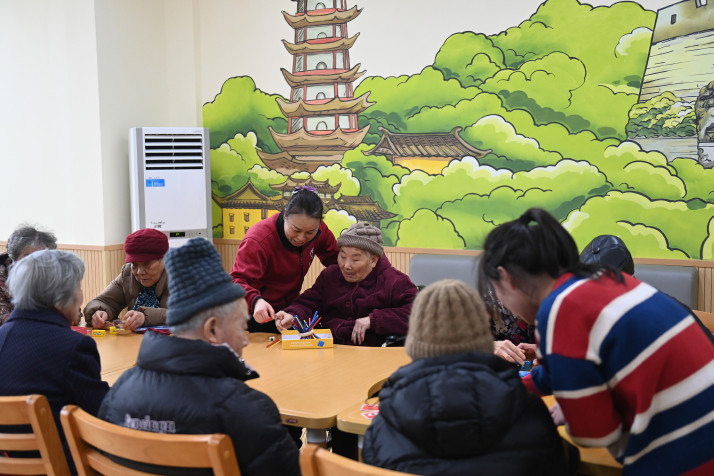| China |
| China's journey toward a comprehensive long-term care system | |
|
|
 Nursing staff (standing) play puzzle games with disabled elderly persons at the Jinshengyi Nursing Home on January 22 (XINHUA)
A blood pressure monitor, a thermometer, alcohol pads, haircut scissors, nail clippers, masks and a bottle of shampoo. These essential items make up Zhang Guifen's toolkit as she visits several homes with disabled family members every day. A resident of Chengdu, capital of Sichuan Province in southwest China, the 50-year-old has been active as a long-term care insurance worker for more than two years. In China, a long-term care insurance worker is a professional who provides care and support to people who require assistance with daily activities due to disability, illness or old age. After passing the certification exam in 2021, Zhang obtained the required license to engage in this profession fulltime. Her responsibilities include helping seniors with disabilities maintain their personal hygiene, which involves skin scrubbing, hair washing, nail trimming and bedsore care. She also monitors vital signs such as blood pressure and body temperature when necessary. The skills required for this type of compassionate work are covered in the training courses for certification, ensuring that caregivers like Zhang are well-equipped for the tasks at hand. For one hour of her dedicated service, Zhang earns 40 yuan ($5.5). Home to home In 2016, China launched a pilot program for long-term care insurance, a strategic initiative designed to offer targeted assistance and financial aid to seniors who are no longer able to care for themselves. Data from the China Research Center on Aging show that as of late 2022, the population of seniors living with disabilities had exceeded 40 million in the country. This number is projected to surge to 100 million by 2030. Chengdu launched a trial of the insurance program in 2017. At that time, awareness of long-term care insurance was limited, leading the local government to introduce a range of strategies to promote the program and encourage participation, particularly targeting women in the domestic service sector. Zhang once worked at a local factory, but after learning about the opportunities available as a long-term care insurance worker, she quit that job. "Working in long-term care offers more flexibility, and many of the assignments are conveniently located near my home," she told Beijing Review. "We can easily move between households on an electric bicycle." The entry requirements for this profession are relatively low. Individuals over the age of 16 can enter this field, regardless of educational background, thanks to a three-tier skill evaluation system in place to support their development. In an entry-level position, a long-term care worker undertakes tasks like assisting with basic hygiene care, such as facial, dental and body cleaning, and helping with meals. At the highest tier, a senior-level worker can provide healthcare guidance to people with chronic illnesses, offer assistance with limb-function training, as well as provide psychological support. Zhang is now at the intermediate level, where she is qualified to perform basic massages and aid in simple rehabilitation exercises. She currently earns over 6,000 yuan ($833) per month and is happy with her income. "It's an appealing option for women like me, with most workers being in their 40s and 50s," she remarked. "The autonomy is attractive, given many prefer not to commit to being a live-in housekeeper. But this job does require genuine care, as well as patience and affection for the elderly." Another rewarding aspect of her job is the sense of being valued. Many of the families she assists show appreciation and respect for her work and offer her snacks and fruits after she completes her tasks. Her daily schedule is tailored around the needs of the families she visits. Recently, she has been getting up at 6:30 a.m., arriving at the first household around 7:30 a.m. On average, she visits six to seven families each day, spending one hour at each household. All care workers are typically affiliated with an agency that arranges and coordinates assignments based on the needs identified by the local medical insurance bureau. Zhang receives her tasks one day in advance, and her schedule is always packed, indicating a rising demand for these services that outpaces the growth in the number of available long-term care insurance workers. "In the past two years, I've noticed a surge in individuals entering this profession, but that number still cannot meet the needs of those requiring assistance," she noted. Witnessing the effects and realities of aging has prompted Zhang to reflect on life and death. "No matter what your past achievements, as we grow older, we all face the same challenges, depending on others for companionship and care," she said. "It really makes me think about my own future."  Medical staff provide services to a disabled elderly person at the Jinshengyi Nursing Home in Zhenhai District of Ningbo, Zhejiang Province, on January 22. Zhejiang is one of the first provinces in China to pilot the country's long-term care insurance program (XINHUA)
A new chapter "As China transitions into an aging society, the care of the elderly has emerged as a pressing concern," He Wenjiong, an expert in senior and healthcare studies at Zhejiang University, said in an interview with Zhejiang TV. He further highlighted that China introduced the long-term care insurance program to address the financial challenges faced by families who have senior members with disabilities, as well as to stimulate job creation. Data from the National Healthcare Security Administration reveal that since its launch in 2016, the program has extended its coverage to 170 million people across China, with over 2 million beneficiaries having received support to date. The initiative has significantly reduced the annual financial burden on the families it covers by an average of 14,000 yuan ($1,945). These outcomes demonstrate significant progress in the program's pilot phases. Most pilot cities have opted for a diverse funding approach, leveraging contributions from various sources, including entities, individuals, medical insurance funds and public finances. Furthermore, efforts have been undertaken to hone the services provided by this insurance program, expanding its reach from urban employees to include rural residents and people with flexible jobs. Despite these advancements, challenges remain in key areas such as financing mechanisms including ambiguous financial responsibilities, standard implementation and service provision, and insufficient coordination among different elderly care-related social security institutions, according to He. Experts, including He, recommend the creation of a unified service list and a guidance catalog for long-term care insurance services, coupled with clear quality evaluation standards. He also pointed out that the program's current focus on basic life care and domestic services may not suffice to meet future demands, underscoring the importance of better access to physical rehabilitation and mental health services for seniors. In late February, China introduced a national professional standard for long-term care workers. This groundbreaking standard, jointly issued by the Ministry of Human Resources and Social Security and the National Healthcare Security Administration, sets clear job and skill requirements. The standard aims to cultivate a more skilled workforce and enhance the long-term care insurance system's efficacy by ensuring that care workers can provide comprehensive life care and psychological support in a range of settings. "The standardization of the long-term care worker role will attract more individuals to the field, fostering a healthier and more sustainable development trajectory for the industry," He said. (Print Edition Title: Compassionate Caregiving) Copyedited by Elsbeth van Paridon Comments to yuanyuan@cicgamericas.com |
|
||||||||||||||||||||||||||||
|